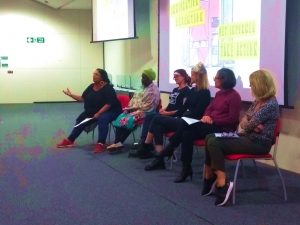Taking action against Immigration Detention in the UK: Reflections on an Evening Symposium
This blog has been published by Dr Louise Tomkow and Isabelle Kidder who both study at the Humanitarian and Conflict Response Institute, University of Manchester. Dr Louise Tomkow is a Geriatric Registrar in the Northwest deanery and a PhD researcher exploring migration and health and Isabelle Kidder is a third year undergraduate studying International Disaster Management and Humanitarian Response with French (BSc).
This blog highlights:
- The UK has one of the largest immigration detention systems in Europe
- The UK is the only European country to have no upper time limit on immigration detention
- Immigration detention causes long term irreversible harm to physical and mental health
- Medact Manchester and These Walls Must Fall hosted a free evening event at the University of Manchester to raise awareness of immigration detention
- Multiple parties to collaborated to suggest ideas of how immigration detention in the UK might be challenged
An introduction to immigration detention in the UK:
The UK has one of the largest immigration detention systems in Europe. Nearly 30,000 migrants entered immigration detention in 2017; around 50% of these individuals had applied for asylum.
The UK Border Agency state immigration detention is used to establish migrants’ identity, the basis of an asylum claim, and in order to facilitate individuals’ deportation. However research shows that decisions to detain migrants in prison-like conditions in Immigration Removal Centres (IRC) under the Immigration Act can be arbitrary, irrational and difficult to justify. Unlike other European countries, the UK has no upper time limit immigration detention. This has been condemned by multiple parties.
Conditions inside IRCs have also been criticised. Eight of the ten IRCs in the UK are run by private companies for-profit. Although asylum seekers are not permitted to work in the UK when not in immigration detention, in 2006 ‘paid activities’ were introduced into UK IRCs. Excluded from the National Minimum Wage Act of 1998, immigration detainees undertake activities such as cleaning and cooking for £1 or £1.25 per hour – the national minimum wage is £7.83 per hour. The vulnerability of detainees makes this work exploitative, coercive and un-free.
Raising awareness and taking action:
On the 16th October 2018, Medact Manchester and These Walls Must Fall hosted a free evening symposium at the University of Manchester: ‘Immigration detention: Get Informed and Take Action’. This aimed to raise awareness of immigration detention in the UK and galvanise interest in anti-detention activism. Over 80 people attended including: academics; students; practitioners; activists; and migrants with first-hand experience of detention.
Louise Tomkow, representing Medact Manchester, provided an introduction to the issue, focussing on the problematic, fluid, and political nature immigration categories. Two films made by These Walls Must Fall campaigners based on direct experiences of immigration detention were screened. Next, the panel of speakers, chaired by Dr Rubina Jasani, Lecturer at HCRI, was introduced:
- Dr Rebecca Farrington, Senior Clinical Lecturer, University of Manchester and GP with specialism in mental health of asylum seekers
- Denise McDowell, Director, Greater Manchester Immigration Aid Unit
- Mariam Yusuf, Campaigner, Women Asylum Seekers Together
- Lauren Cape-Davenhill – Activist and campaigner at These Walls Must Fall
Each speaker drew on their expertise to provide a rich overview of the issues facing immigration detainees. Rubina facilitated a lively, impassioned discussion session, which included debates around gender and sexual violence, and involved some attendees sharing personal lived experiences of immigration detention.

From L to R: Dr Rubina Jasani, Mariam Yusuf, Lauren Cape-Davenhill, Louise Tomkow, Dr Rebecca Farrington and Denise McDowell.
Key Issues:
The evening’s discussion was rich and acknowledged the complexity of the issues faced by vulnerable migrants. Three key issues emerged from the event:
First is that of mental health. Immigration detention has long term and irreversible impacts on physical and mental health. 2017 was the most deadly in the UK for immigration detention, with 9 deaths of detainees held under immigration charges. The panel’s academics and practitioners discussed empirical evidence about the mental health impact of immigration detention. Those who had experienced detention first hand provided more moving testimony; even years after being detained they described pervasive fear, anxiety, insomnia and anger.
The issue of legal representation also dominated discussions. Cuts to legal aid in 2012 mean that many immigration detainees have no access to legal representation. Home Office guidance states that torture victims and particularly vulnerable migrants should not be detained; evidence shows this is routinely disregarded. Moreover, although detainees’ have a right to appeal their detention, the scarcity of quality legal assistance means that in reality the opportunities to appeal are limited.
Finally, there was a dominant focus on raising awareness and potential for activism. Despite some attendees having experience in the field of migration, many reported being shocked and angry in light of the issues discussed. The role of the media, who often vilify migrants, and the current ‘Hostile Environment’ policies, which adopt a punitive approach to migration in the UK were discussed. Lauren guided the discussion, encouraging a consideration of how we might take action to end immigration detention. Suggestions included:
- Use social media to get involved with local activist’s campaigns, such as Medact Manchester; These Walls Must Fall;
- Join or set up a student society to take action on detention, such as STAR or Refugee Rights Collective
- Encourage the student union to pass a motion against detention
If you are interested in taking action to end immigration detention, These Walls Must Fall’s website includes many more suggestions, including templates that can be used to write to politicians and media outlets.


0 Comments